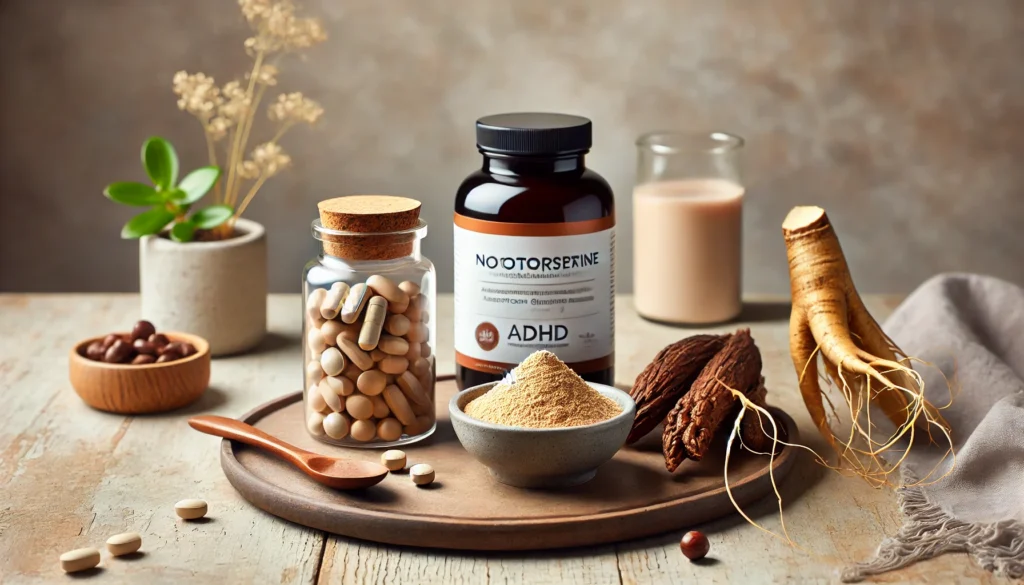ADHD, or Attention Deficit Hyperactivity Disorder, affects millions of individuals worldwide, creating significant challenges in areas such as concentration, organization, and task completion. While conventional treatments, including medication and therapy, are frequently employed, there is a growing interest in alternative approaches, such as dietary supplements. This article delves into the top focus supplements for ADHD management, offering insights into how they can potentially enhance cognitive function and improve quality of life.
You may also like: Top Nootropic Brands for Enhanced Focus

Understanding ADHD and Its Implications
ADHD is a neurodevelopmental disorder characterized by symptoms such as inattention, hyperactivity, and impulsivity. These symptoms can severely impact academic performance, professional success, and interpersonal relationships.
The Nature of ADHD
ADHD is not merely a childhood disorder, as it often persists into adulthood. The symptoms can manifest differently across age groups, with children often displaying more hyperactivity and adults experiencing issues with inattention and executive function. This variability necessitates personalized management strategies.
Impact on Daily Life
The symptoms of ADHD can disrupt various aspects of daily life, from maintaining relationships to achieving educational and professional goals. Individuals with ADHD may struggle with time management, organization, and maintaining focus, leading to stress and decreased self-esteem.
Conventional Treatment Approaches
The complexity of ADHD means that management often requires a multi-faceted approach. While stimulant medications like methylphenidate and amphetamines are standard treatments, they are not suitable for everyone due to potential side effects and varying efficacy. As such, many individuals with ADHD are turning to supplements as a complementary strategy to support their cognitive function.
The Role of Dopamine in ADHD
One of the critical neurotransmitters implicated in ADHD is dopamine. This chemical messenger plays a vital role in attention, motivation, and reward. People with ADHD often have lower levels of dopamine, which contributes to their symptoms. Consequently, supplements that increase dopamine levels can be beneficial.
Understanding Dopamine and Its Functions
Dopamine is essential for regulating mood, attention, and motivation. It acts as a chemical signal that helps transmit information in the brain. In ADHD, the brain’s dopamine systems may be underactive, leading to difficulties with focus and impulse control.
Dopamine Dysregulation in ADHD
The dysregulation of dopamine in ADHD is complex and can involve both genetic and environmental factors. Research suggests that the brain’s reward pathways, which rely heavily on dopamine, function differently in individuals with ADHD. This can result in challenges with motivation and task persistence.
Benefits of Dopamine-Enhancing Supplements
By targeting dopamine levels, certain supplements may help improve attention, reduce impulsivity, and enhance motivation. These supplements offer a non-pharmacological option for individuals seeking to manage their ADHD symptoms more naturally.
Supplements to Increase Dopamine
L-Tyrosine
L-Tyrosine is an amino acid that serves as a precursor to dopamine. By increasing the availability of the building blocks needed for dopamine production, L-Tyrosine can support improved focus and mental clarity.
Mechanism of Action
L-Tyrosine works by providing the necessary components for dopamine synthesis. It is converted into L-DOPA, which is then transformed into dopamine in the brain, potentially alleviating symptoms associated with dopamine deficiency.
Benefits and Considerations
L-Tyrosine may help improve cognitive function, particularly during stressful situations or periods of mental fatigue. However, its effectiveness can vary, and individuals should monitor their response to supplementation carefully.
Dosage and Safety
Starting with a low dose and gradually increasing as needed is advisable. Consultation with a healthcare provider is essential to determine the appropriate dosage and to avoid potential interactions with other treatments.
Mucuna Pruriens
This natural supplement contains L-DOPA, a direct precursor to dopamine. Mucuna Pruriens can help enhance dopamine levels, potentially improving attention and reducing hyperactivity in individuals with ADHD.
How It Works
Mucuna Pruriens is a tropical legume that naturally contains L-DOPA, which the brain converts into dopamine. This process can support neurotransmitter balance and improve cognitive functions such as focus and motivation.
Research and Efficacy
Studies suggest that Mucuna Pruriens may be beneficial for individuals with ADHD by supporting dopamine production. Its natural origin makes it an attractive option for those seeking alternatives to synthetic medications.
Usage Guidelines
As with any supplement, it’s crucial to start with a low dose and adjust based on individual response. Regular consultation with a healthcare provider can ensure safe and effective use.

Focus and Energy Supplements for ADHD
In addition to dopamine-focused supplements, various other compounds are known to support focus and energy, which can be particularly beneficial for those with ADHD.
Omega-3 Fatty Acids
Omega-3 fatty acids, particularly EPA and DHA, are essential for brain health. They play a significant role in reducing inflammation and supporting neurotransmission. Studies have shown that children with ADHD often have lower levels of omega-3s, suggesting supplementation could aid in managing symptoms.
Importance in Brain Health
Omega-3 fatty acids are crucial components of cell membranes in the brain. They contribute to the fluidity and function of neuronal membranes, which is essential for effective signal transmission and cognitive processes.
Impact on ADHD Symptoms
Research indicates that omega-3 supplementation may help reduce symptoms of ADHD, such as inattention and hyperactivity. The anti-inflammatory properties of omega-3s also support overall brain health and development.
Recommendations for Supplementation
For optimal benefits, individuals should consider high-quality fish oil supplements rich in EPA and DHA. Dosages should be tailored to individual needs, with guidance from a healthcare provider.
Ginkgo Biloba
Ginkgo Biloba is an ancient herbal remedy known for its cognitive-enhancing properties. It improves blood flow to the brain, which can help increase concentration and mental clarity.
Mechanism of Action
Ginkgo Biloba enhances cerebral circulation, ensuring a steady supply of oxygen and nutrients to brain cells. This increased blood flow can improve cognitive functions such as memory, attention, and processing speed.
Potential Benefits for ADHD
For individuals with ADHD, Ginkgo Biloba may aid in improving focus and reducing distractibility. Its antioxidant properties also help protect brain cells from oxidative stress.
Usage and Safety
To maximize benefits and minimize risks, it is important to use Ginkgo Biloba under the supervision of a healthcare provider. Starting with a low dose and monitoring for any side effects is recommended.
Rhodiola Rosea
Rhodiola Rosea is an adaptogen that helps the body manage stress while boosting energy and focus. It’s particularly useful for those with ADHD who may experience mental fatigue and burnout.
Adaptogenic Properties
As an adaptogen, Rhodiola Rosea helps the body adapt to stress by balancing stress-related hormones. This can lead to improved mental endurance and resilience in challenging situations.
Benefits for Cognitive Function
Rhodiola Rosea may help enhance concentration, reduce mental fatigue, and improve mood, all of which are beneficial for individuals managing ADHD symptoms. Its energy-boosting properties can also support sustained focus throughout the day.
Considerations for Use
When incorporating Rhodiola Rosea into a supplement regimen, it’s important to start with a low dose and adjust based on individual needs. Consultation with a healthcare provider is advisable to ensure safe and effective use.
Focus Pills for ADHD
Focus pills, often referred to as nootropics, are designed to enhance cognitive function. While many nootropics are synthetic, several natural options can be beneficial for ADHD management.
Bacopa Monnieri
Bacopa Monnieri is an herb traditionally used in Ayurvedic medicine. It is known to enhance memory and cognitive function, making it a popular choice for those seeking to improve focus and concentration.
Traditional Uses and Modern Research
Bacopa Monnieri has been used for centuries to support brain health and enhance cognitive performance. Modern research supports its use as a natural nootropic, highlighting its ability to improve memory retention and processing speed.
Impact on ADHD Symptoms
Individuals with ADHD may benefit from Bacopa Monnieri’s ability to enhance attention and cognitive flexibility. Its calming effects can also help reduce stress and anxiety, common co-occurring issues in ADHD.
Dosage and Administration
For best results, Bacopa Monnieri should be taken consistently over several weeks. Starting with a low dose and gradually increasing is recommended, with guidance from a healthcare provider.
Ginseng
Ginseng is another herbal supplement with strong nootropic properties. It can boost mental performance and is often used to combat fatigue and increase energy levels.
Types and Benefits
There are several types of ginseng, including American and Asian ginseng, each with unique properties. Ginseng is known for its ability to enhance mental clarity, improve mood, and support physical stamina.
Application for ADHD
For individuals with ADHD, ginseng may help improve attention, reduce impulsivity, and enhance overall cognitive function. Its energizing effects can also support sustained focus and productivity.
Safe Use Practices
When using ginseng, it’s important to be mindful of potential interactions with other medications and supplements. Consultation with a healthcare provider can help ensure safe and effective use.
Phosphatidylserine
This phospholipid is crucial for maintaining cell membrane integrity in the brain. Phosphatidylserine supplementation has been linked to improved cognitive function and memory, providing potential benefits for individuals with ADHD.
Role in Brain Health
Phosphatidylserine is a key component of cell membranes, supporting neuronal communication and function. It plays a critical role in maintaining cognitive health and performance.
Benefits for ADHD
Supplementation with phosphatidylserine may help improve attention, memory, and executive function in individuals with ADHD. It supports overall brain health and may reduce age-related cognitive decline.
Recommendations for Supplementation
As with other supplements, starting with a low dose and gradually increasing is advisable. Regular monitoring and consultation with a healthcare provider can ensure optimal benefits and safety.
Practical Advice for Supplement Use
While these supplements can offer benefits, it’s essential to approach their use with caution. Not all supplements are suitable for everyone, and their effectiveness can vary. Here are some practical tips:
Consult a Healthcare Professional
Before starting any supplement regimen, especially for ADHD, it’s crucial to consult with a healthcare provider. They can help assess potential interactions with other medications and determine the appropriate dosage.
Importance of Professional Guidance
Healthcare professionals can provide valuable insights into the potential benefits and risks of supplements. They can tailor recommendations based on individual health needs and existing treatments.
Assessing Individual Needs
Each individual’s experience with ADHD is unique, and supplement needs may vary accordingly. A healthcare provider can help identify the most suitable options based on symptoms and lifestyle factors.
Start with Low Doses
Begin with the lowest recommended dose to assess your body’s response. Gradually increase as needed, but never exceed the recommended limits.
Importance of Titration
Starting with a low dose allows the body to adjust to the supplement and helps identify any adverse reactions. This cautious approach can prevent potential side effects and ensure safe use.
Monitoring and Adjusting
Regularly monitor symptoms and overall well-being to determine the effectiveness of the supplement. Adjustments to dosage or supplement type may be necessary based on individual response.
Monitor Effects
Keep track of any changes in symptoms and overall well-being. This can help you and your healthcare provider determine the effectiveness of the supplement.
Tracking Progress
Maintaining a journal or log can help document changes in focus, mood, and energy levels. This information is valuable for assessing the impact of supplements and making informed decisions.
Collaboration with Healthcare Providers
Sharing observations with healthcare providers can facilitate ongoing evaluation and adjustment of the supplement regimen. This collaborative approach ensures optimal management of ADHD symptoms.
Quality Matters
Choose high-quality supplements from reputable brands to ensure safety and efficacy.
Importance of Quality Assurance
High-quality supplements are more likely to contain the stated ingredients and dosages, reducing the risk of contamination and ensuring effectiveness.
Selecting Reputable Brands
Researching and selecting reputable brands can provide confidence in the quality and safety of supplements. Look for products that undergo third-party testing and adhere to industry standards.

The Future of ADHD Management with Supplements
As research into ADHD and its management continues, the role of supplements in supporting cognitive function is becoming more evident. While they are not a replacement for traditional treatments, supplements can serve as a valuable addition to a comprehensive ADHD management plan.
Evolving Research Landscape
Ongoing research is uncovering new insights into the mechanisms of ADHD and the potential benefits of various supplements. This expanding knowledge base is paving the way for more personalized and effective management strategies.
Integrating Supplements into Treatment Plans
Supplements can complement traditional treatments, providing additional support for managing symptoms. By working with healthcare providers, individuals can develop comprehensive plans that incorporate both conventional and alternative approaches.
Personalized Approaches to ADHD Management
The journey of managing ADHD is deeply personal and may require a combination of strategies tailored to individual needs. By exploring focus supplements, individuals with ADHD, along with their healthcare providers, can gain another tool to help improve attention, reduce hyperactivity, and enhance overall quality of life.
Embracing New Possibilities
The growing interest in supplements for ADHD is a testament to our evolving understanding of the condition and the potential for alternative therapies to play a significant role in its management. As always, the key is to remain informed, cautious, and open to exploring new possibilities in the pursuit of optimal health and well-being.
By staying informed and open-minded, individuals with ADHD can actively participate in their health journey, exploring new options and customizing their management plans to suit their unique needs and preferences.
Further Reading: 9 Supplements to Help Manage ADHD: A Dietitian’s Picks
Do Natural Supplements Help With ADHD?
Top 5 Supplements for ADHD: A Guide for Children and Adults
Important Note: The information contained in this article is for general informational purposes only, and should not be construed as health or medical advice, nor is it intended to diagnose, prevent, treat, or cure any disease or health condition. Before embarking on any diet, fitness regimen, or program of nutritional supplementation, it is advisable to consult your healthcare professional in order to determine its safety and probable efficacy in terms of your individual state of health.
Regarding Nutritional Supplements Or Other Non-Prescription Health Products: If any nutritional supplements or other non-prescription health products are mentioned in the foregoing article, any claims or statements made about them have not been evaluated by the U.S. Food and Drug Administration, and such nutritional supplements or other health products are not intended to diagnose, treat, cure, or prevent any disease.


